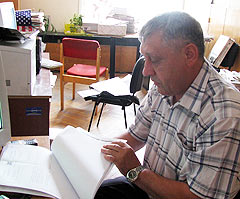A Case of Theft Investigated for 10 years
 In September 1998 Valcu went to work without imagining that one of his neighbours planned to rob his flat while he was not at home. According to the man, the amount of goods stolen totalled 8,000 lei.
In September 1998 Valcu went to work without imagining that one of his neighbours planned to rob his flat while he was not at home. According to the man, the amount of goods stolen totalled 8,000 lei.
Police suspected the robbery was committed by one of Valcu’s neighbours, Iurie J. then a minor. Two months after the robbery was committed, the boy was formally charged. After that, the investigation was suspended. The penal pursual was started again seven years later, in July 2005.
Valcu affirmed that since he filed the complaint at the police station he has yet to be informed of the file’s contents, and he has resorted to contacting the prosecutors and the policemen involved in the case in order to seek information on its progress. He wondered how it is possible that a case which should have been solved in a few months has lasted for nine years, something that has caused him both moral and material losses.
Cases pursued at the discretion of prosecutors
Asked by Ziarul de Gardă, lawyer Iuries Perevoznic mentioned that in such cases previous that the previous legislation of penal procedure stipulated a a certain time (two months) that a case must be investigated in. But after the adoption of the Penal Procedure code in 2003, when a fixed term of pursuing cases was abandoned, the issue of who the perpetrator of the crime is has to be investigated by an officer only in a ‘reasonable timeframe’. this fact brings responsibilities to law bodies, but decisions depend on the maturity and good sense of each officer,” Perevoznic mentioned.
After the investigation was started again in July 2005 it was cancelled and reopened several times. All the time, according to Valcu, the suspect was abroad. He affirmed that he wrote many letters to the Prosecution Office in Chişinău to find out more details about his case and insisted on its being resolved.
On April 10 2007, nine years after the robbery, the court in Chişinău finally sentenced Iurie J. and forced him to pay Valcu 7,513 lei. However, only the court clerk, the prosecutor and the lawyer of the offender were present at the trial.
Valcu stated that, besides the fact that he was not invited to attend the trial, nobody told him about the sentence that was handed out to the perpetrator of the crime. “In August 2007 the prosecutor, Spanu, told me that the file was given to the Central Law Court in Chişinău a long time before the trial. Yet when I contacted them for information on the case they said the file couldn’t be found because it hadn’t been registered at their offices,” Valcu affirmed.
Mulțumim că citești ZdG!
Ajută-ne să continuăm să furnizăm informații esențiale — donează pentru jurnalismul nostru.
The loss of a file: one method of solving a case
According to the head of the Helsinki Committee for Human Rights in Moldova, Stefan Uratu, the loss of files represents a way for law bodies to solve cases in certain people’s favour. “In the Republic of Moldova the right to a fair trial is flagrantly violated, especially in the penal pursuing phase.” Uratu considers that a reasonable period of time for gathering evidence in a case such as Valcu’s is six months and the fact that this was exceeded violates the correct manner in which the case was investigated.
According to the jurist Lilia Gulca, the trial which took place in the absence of Valcu should have been postponed, especially because Valcu hadn’t been informed it was taking place.
Valcu doesn’t agree with the compensation the Central Law Court decided on, because 7,531 lei has a different value now than what it did 10 years ago. “In 1998, with such a sum of money I could buy a one-bedroomed flat, now I can buy nothing with it.” he said.
Valcu has filed an appeal, asking for the case to be looked at again, yet this was rejected by the Court of Appeal, as, according to lawyers, “the case lacks certain information from Valcu, yet the case of the investigative period being violated isn’t sufficient grounds for issuing a new sentence.”
The head of the HCHRM, Stefan Uratu, affirmed that the European Court for Human Rights has mentioned in a few cases in the Republic of Moldova that ‘a fair trial’ also means a reasonable penal pursuing phase. As for Valcu’s case, Uratu recommended him to ask the Central Prosecution Office for the measures taken to solve to the case and, if in a few months nothing has happened, he should address the ECHR.



